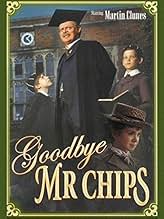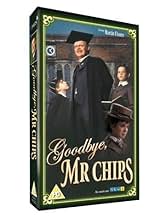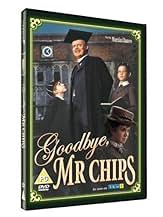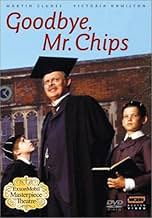Goodbye, Mr. Chips
- टीवी फ़िल्म
- 2002
- 1 घं 39 मि
अपनी भाषा में प्लॉट जोड़ेंIn the later years of the nineteenth century Latin master Mr. Chipping is the mainstay of Brookfields boys boarding school, a good teacher and a kindly person but he is considered to be marr... सभी पढ़ेंIn the later years of the nineteenth century Latin master Mr. Chipping is the mainstay of Brookfields boys boarding school, a good teacher and a kindly person but he is considered to be married to the job so that it is a surprise when, on a walking holiday, he meets and marries t... सभी पढ़ेंIn the later years of the nineteenth century Latin master Mr. Chipping is the mainstay of Brookfields boys boarding school, a good teacher and a kindly person but he is considered to be married to the job so that it is a surprise when, on a walking holiday, he meets and marries the vivacious Kathie, who becomes his helpmate at the school but sadly pre-deceases him. Ju... सभी पढ़ें
- निर्देशक
- लेखक
- स्टार
- Hawthorne
- (as James Malcolm)
फ़ीचर्ड समीक्षाएं
Absolutely excellent! 10/10 !
Martin Clunes' effort in the role does not quite match the towering performances of the other two actors, but he's very good, and the other aspects of the production work as well as the '39 version and definitely better than the particularly flawed '69 film. Here, the logic and coherence of the story flow extremely well within less than two hours. The makeup accurately reflects the changing time period of the story exceptionally well. There is a greater emphasis on the progressive aspects of education than in the other two versions, but this emphasis contributes appropriately to the story line. The cast is uniformly excellent.
Overall, a bit less sentimental than the '39 version, which I appreciated. A worthwhile remake, and definitely worth your time - whether you've seen the other versions or not. I'd give it about 8.5 out of 10.
The 2002 Masterpiece Theatre adaptation takes cues from the three previous versions, while making choices that enhance the James Hilton novella. From the 1939 version, this adaptation embodies the relationship that Mr. Chips has with his students and his willingness to help others before meeting Katherine. It starts off with a relatively young Chips arriving at Brookfield. During the opening credits, as he walks around campus, various boys spot him and mimic his walk. In addition, from a window, a teacher points out Chips's ears. This establishes how different he is from the other faculty and how kids are always looking for new meat to mess with. The chaos of Mr. Chips's first day is also similar to that of the 1939 version as the boys messing with him do so out of amusement. Heck, it even has the similar dialogue to the older adaptation when Headmaster Wetherby comes by and orders punishments for the students. One kid plays possum after he writes that word on the chalkboard. Later, when Colley slams his book twice, Chips calls him out by comparing him to a dog, thus putting the kid in his place.
In addition, before meeting Katherine, he is shown helping various students. In the 1939 version, there's only one scene where Chips tries to comfort a child with little success before he encounters his love interest. Here, there are more scenes of him aiding various boys. In one scene, he witnesses a group of boys initiate a new kid by putting him in a barrel full of water and later hanging him like Jesus at the cross. Chips gets him down and confronts the cruel housemaster Metcalf (in previous versions, he is a headmaster). Soon after, a nerdy student named Hawthorne confides in Mr. Chips about wanting to get into Cambridge despite his background. The teacher assists him with his studying in an English-like manner, and the student eventually gets in. It's devastating to find out later that Hawthorne is among the killed during the war. This adaptation definitely captures the playfulness and seriousness of the relationship between Chips and the students at Brookfield that's also present in the 1939 adaptation.
Like the 1969 version, the Masterpiece Theatre one has a similar structure and gives Max Staefel more of a character and more of a purpose in the story. Both are the only ones that don't use flashbacking as a main framework. Instead, they show Mr. Chips's story in a linear fashion. I bet this was done because the flashback as a framing device was so well done in the 1984 miniseries that the people involved like director Stuart Orme couldn't come up with a way to better it. Additionally, Max has more of an inner life. In the 1969 version, Max is the only friend that Chips has at Brookfield, and he puts the latter in his place when needed. Later on, when war is looming, Max is called back to Germany. He expresses to Chips, "Do you think I want to go back?"
I know that it's not much character development, but it's more than Max is given in other adaptations besides the 2002 one. In the Masterpiece Theatre version, Max (played by Conleth Hill who is best known for playing Lord Varys in "Game of Thrones") is present from the very beginning. He meets Chips on his first day, and when the latter has his disastrous first day of teaching, Max persuades Wetherby to give Chips another chance. As a result, Chips feels grateful for Max's intervention, and this begins a friendship that lasts for decades. When the Great War is looming and anti-German prejudice is high, the bigoted Headmaster Ralston persuades Max to retire. Even though Chips is upset by this, Max is more resigned because of the anti-German sentiment in the air. This leads to the confrontation between Chips and Ralston, in which the latter tries to persuade the former to retire. In addition, expanding Max in this way gives Chips, when as Headmaster, more of a reason to read his name when he is killed on the Western Front.
Finally, what the 2002 version takes from the 1984 series is how Katherine is depicted. Both adaptations portray Katherine's youthfulness. While Jill Meager from the 1984 version shows this through her spry performance, Victoria Hamilton (who is best known for playing one of the title characters in the "Victoria & Albert" television miniseries and the Queen Mum in seasons 1 and 2 of "The Crown") plays up the character's naivety with her wide-eyed stares. This is most apparent when Katherine and Chips meet for the first time. Katherine sits on a tree branch overlooking a river to watch the fish, not aware of the peril that she put herself in. When that branch breaks, Chips is able to rescue her. This is the only version in which he successfully saves her. Moreover, both adaptations play up her socialist views and her need to make a difference in the world. When they meet, Katherine and Mr. Chips discuss women being doctors and George Bernard Shaw. Soon after, she gives Chips a book about socialism written by that man. Later on, when they marry and Katherine moves in, she strives to improve the students' wellbeing. This involves talking to Wetherby about the bullying on campus, resolving differences between a pair of students, and organizing a social for the boys with a set of girls from a different school. Although Katherine doesn't live for long, I'm glad this adaptation makes her active in the story, both in helping Chips become more empathic and in her own right.
The 2002 television movie also makes choices that enhance the James Hilton story. This version takes on a more realistic tone than the previous adaptations. This is apparent in how Brookfield the school is depicted. It explores the systematic bullying that occurs at said school. There are several incidents, in which students get harassed by their peers and their teachers. Chips (and later Katherine) get involved and try to help through compassion and understanding. At one point, Mr. Chips has to discipline a boy for being on the roof. After he canes the student on the palm of the latter's hand, he throws the cane across the room, thus vowing never to punish a child in that way again. Even the sound effect the film uses for the cane sounds extremely harsh. Later on, Mr. Chips has a realization that disciplining the students in such a strict and cruel way doesn't make them act any better. This is also true during the war scenes. Students are learning how to use bayonets on the school grounds. Even an older Colley (played by a young Henry Cavill) comes home with a leg missing. The realistic portrayal of Brookfield shows what work Chips has cut up for him and makes the results of his interventions all the more impactful.
The realistic tone is also obvious in how Martin Clunes portrays the titular character. When Chips is young, Clunes plays with a sense of naivety, but not completely innocent. As Chips gets older, Clunes lowers his voice without putting on an old-man one. The makeup reflects this realism by aging Clunes naturally, and it's the best use of it in all of the adaptations. It also helps that Clunes's physical appearance allows him to play characters of various ages. In addition, the actor takes on the stoicism of the character, while also being emotional at various points of the story. In fact, Clunes shouts in a variety of scenes. This can be a bit much, yet it's most effective when Chips confronts Ralston about forcing Max to retire. When this scene is depicted in the previous adaptations, Chips usually raises his voice, but never yells. Clunes takes that to another level by having Chips outright shouting at Ralston after the latter confronts him about his teaching ways and tries to get him to retire. This makes the students all the more adamant to fight for his honor, whereas in previous adaptations, they are shocked and not much else. Overall, Clunes's performance shows that even Mr. Chips struggles himself to remain constant while the world is changing around him.
In spite of all of the praise I've lavished on the 2002 version, I have one caveat. Many of the scenes in the television movie play and end a bit too quickly. I can understand why this was done to make time for the Exxon Mobil ads, but it's from PBS. They don't cut to commercials during their shows. This swiftness makes this version the shortest of all the adaptations, clocking in at 1 hour and 44 minutes. If the movie slowed down just a little, then I think it would be neck and neck with the 1939 film in terms of effectiveness.
All in all, the 2002 version of "Goodbye Mr. Chips" is the most effective of the adaptations outside of the 1939 adaptation. It takes elements from the previous films in order to expand certain characters and the varying relationship between Chips and his pupils. In addition, its realistic tone helps to explore the circumstances Mr. Chips is in as a teacher. Martin Clunes takes on the titular character in a way that's familiar and different at the same time. It's not perfect mind you, but it's worth the watch. I would recommend it for those like Martin Clunes and want to see every version of "Goodbye, Mr. Chips" (like myself).
क्या आपको पता है
- ट्रिवियाMr. Chipping tells his pupils about the mathematical theorem Pons Asinorum ("The Bridge of Donkeys"). This refers to Euclid's theorem that the angles opposite the equal sides of an isosceles triangle are equal.
- गूफ़When Mr. Chipping first kisses his wife-to-be, he is already wearing a wedding ring on his ring-finger. This is incorrect. His ring is on his right hand, a wedding in ring is worn on the left hand.
- भाव
[Chipping has threatened to resign because he is being ordered by Ralston, the new headmaster, to make fundamental changes and modernisations to the way that he teaches and he is vigorously opposed to these changes. In Assembly, Ralston assumes that Sir John Rivers, Chairman of the Governors, will support him in this. However Rivers is an old boy of the school and has his own loyalties]
Ralston: In the few weeks since I've been Headmaster, we've achieved a great deal. But there's more to be done. Some of you may recognise our guest this morning - a pleasant surprise - Chairman of the Governors, Sir John Rivers. And I'm sure that he will have a few words to say to us about the *necessary* changes which Brookfield must now embrace.
[Rivers looks furious at what Ralston is expecting him to say]
Sir John Rivers: Good morning, gentlemen. My time at Brookfield shaped my life, and I'm pleased and proud to be here today to acknowledge that. The Headmaster has spoken of change, and we must all embrace change, how ever unpleasant. But we at Brookfield must also be aware of that sense of continuity, that sense of tradition, that has made us what we are - Brookfeldians. As you are aware, one of the pillars of the school has been your and my Latin teacher, Mr Chipping. You are also aware that we have been in danger of losing him. I now invite him to change his decision, and to confirm that he will stay with us, by leading us all in the School Prayer.
[Rivers sits down]
Ralston: [whispers angrily] You have placed me in an *impossible* position.
Sir John Rivers: [grinning] You've done that for yourself.
[Ralston looks utterly defeated as all the boys start to chant "Chips, Chips" in support of Chipping, to persuade him to change his mind]
- कनेक्शनReferenced in Comedy Connections: Men Behaving Badly (2003)
टॉप पसंद
विवरण
इस पेज में योगदान दें
































